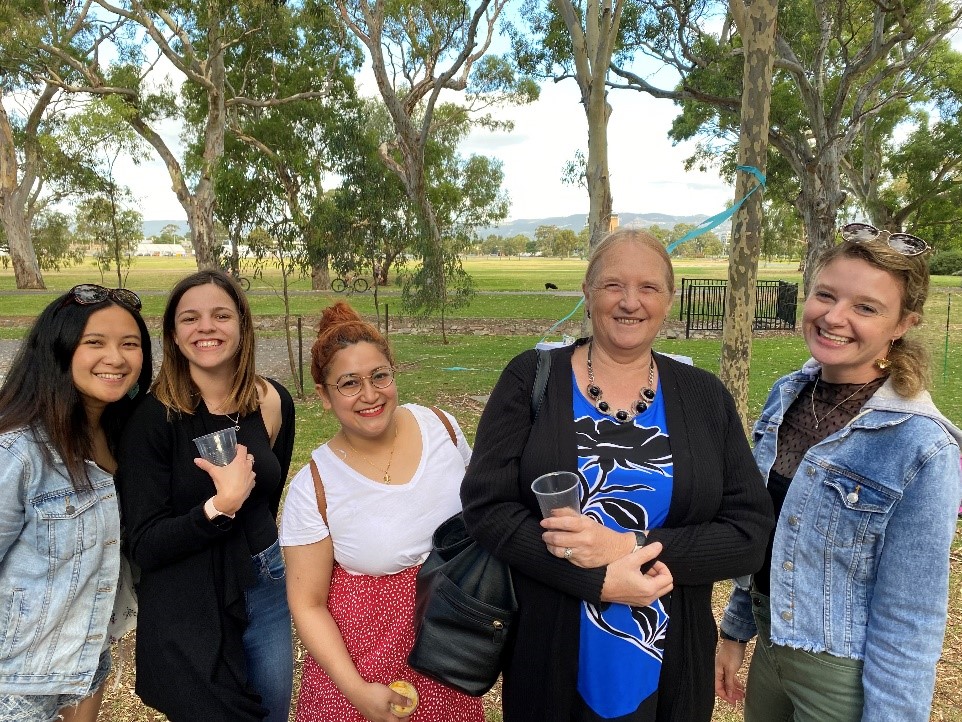(Photo: Wollongong Emergency Housing team)
For over two years the community sector has been on the frontline of the COVID-19 pandemic and has been caring for our community’s most vulnerable. We have seen them step up, protect lives and help people through the most difficult circumstances. To recognise frontline workers and the personal toll this work has on their health and wellbeing, in 2020 we set up our SmartCare initiative. To date we have made $67,000 of grants to 26 organisations, and we need your support to do more in 2022.
“Thank you so much, that is great news. We are very grateful – this grant is a real boost during these tough times, so thank you to StreetSmart for our SmartCare grant, it will put a smile on all our (masked) faces. Thanks to all the donors and supporters for thinking of us. We have some team building activities planned. Thanks again.”
Tracy Phillips, Bonnie Support Services

(Photo: St Johns Youth Serv ice
The recent (April 2022) Carrying the Costs of the Crisis Report– undertaken by the Social Policy Research Centre at UNSW Sydney for ACOSS, concluded that the community sector continues to be “underfunded, overworked and underpaid” and that the COVID-19 pandemic has compounded the already considerable weaknesses within the service sector. Workers, across the sector, have shown “determination, resilience, innovation, and extraordinary industriousness”, as “organisations swiftly adapted service models to sustain appropriate support for people experiencing disadvantage, poverty, and hardship, and to help communities navigate health, economic and social disruption.”
Organisations identified that funding fell far short of what was required, with only 20% saying that funding covered the full cost of service delivery. The financial outlook was poorest among organisations whose main income stream came from the Federal Government. Two in three leaders said their organisations are finding it more difficult to source donations from the public and business.
The burden to keep delivering essential support, in an increasingly complex operating environment, has then fallen on overworked staff who have been pushed to their limits.
Towards the end of 2021 and through 2022 these burdens have continued as governments adopted more passive approaches to managing the pandemic, withdrawing financial supports, and shifting responsibility onto individuals, families, and communities. These strategies have resulted in high case numbers and infection rates, across vulnerable communities, who then seek support from community services ill equipped to meet rising demands. Loss of volunteers due to the pandemic, in the context of rising demand, also impacted on the time and tasks required of paid staff. These circumstances, coupled with drastic rises in cost of living and a chronic lack of affordable housing means that staff are exposed to traumatic circumstances with few solutions for clients. The work can be distressing and this also takes a toll on workers.
“Community sector workers and service leaders, about 80 per cent female, are being forced to carry an enormous physical and psychological burden to cover funding shortfalls and ensure people in need can still access essential services,”
Cassandra Goldie CEO ACOSS
The report revealed enormous pressure and strain on community sector workers as demand for services continues to rise.
“The level of uncertainty we are all working with during COVID is challenging and exhausting. This makes the impact of regular funding cliffs and no job security harder. We really need longer funding cycles in this environment.”
(Frontline worker, legal, advocacy and peaks, QLD)
Workloads increased while job security and pay rates remained low, leading community sector workers and leaders to offset funding shortfalls by performing large amounts of unpaid work. 61% of organisations had seen job losses, non-renewal of contracts, loss of work for casual or fixed term staff. The short-term nature of some Government contracts means that only 5% of leaders said their organisation received at least 6 months’ notice about renewal. Some reported being given only 2 weeks notice. This makes it impossible for organisational leaders to plan with certainty, and staff often leave to secure work elsewhere before the contract is renewed or ended.
Under-investment in the sector is not new, but the pandemic has revealed heightened risks of workforce attrition and burnout.
“We need security in our roles, most of us risk burnout and compassion fatigue at any one time. The added fear of funding ending makes the stress very hard to manage.” (Frontline worker, Financial support services, QLD)
“The system is broken and we are heading full steam into a serious crisis.” (Frontline worker, housing and homelessness services, QLD)
StreetSmart recognises that to have an effective sector able to assist people in crisis we need to look after our workers, without them services can’t be delivered.
People caring for marginalised and disadvantaged people often don’t take the time or have the necessary tools to look after their own mental and physical wellbeing. In order for charities to retain talented, caring and professional people they need to make sure their staff are supported. SmartCare provides small community grants to support our frontline workers, through reward, recognition and well being training.



